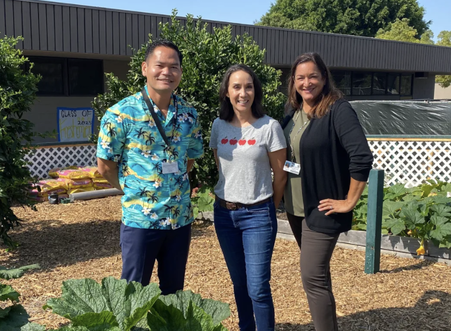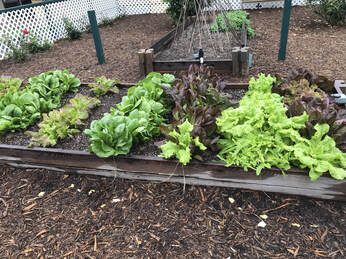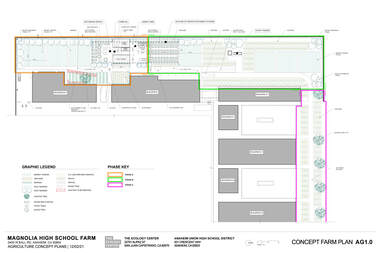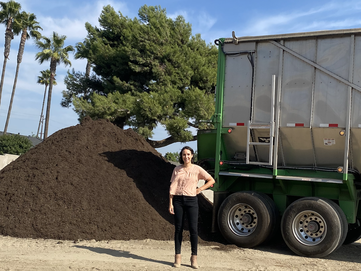Tilling A Social and Cultural Shift
|
A farm located in the middle of Anaheim, roughly three miles west of Disneyland, may seem out of place. Not to the Anaheim Union High School District, though, who is hoping that the farm can not only flourish, but also address food insecurity, facilitate lesson plans about agricultural practices, benefit the environment, and teach students about environmental injustice.
Sabina Giakoumis, an adjunct professor in the School of Education’s MAT + Credential program and Biology teacher at Anaheim-based Magnolia High School, is leading the development of the farm, known as the Magnolia Agriscience Community Center (MACC). The MACC will serve all 20 AUHSD campuses by offering learning labs during the school day, along with community-engagement opportunities to AUHSD parents and local residents during the evening. In 2016, Giakoumis began planting seeds in garden beds near her classroom with her high school biology class, and quickly noticed the impact gardening had on her students. |
After teaching her students about soil quality and composting, the garden began producing vegetables that the students could take home. She enlisted the students to share the dishes they would prepare from the vegetables they had grown. Inspired by these multicultural dishes and the excitement received from her classroom, she hoped to start the process to bring a larger-scale garden to the community and expand the excitement.
|
Not satisfied with a 3,000 square foot garden, students in the agriculture club and Giakoumis, with the support of the AUHSD, began building the 2.5 acre farm on the Magnolia HS campus. The MACC will eventually have rows of fruit trees, berry patches, an array of vegetables, and a greenhouse.
Giakoumis envisions the farm serving myriad purposes – improving learning outcomes and equity, guaranteeing healthier foods for all students of different economic backgrounds, and inspiring students across the AUHSD to bring social change to their own communities. Giakoumis said that many of the students’ families live in a neighborhood that is considered a food desert – an area in which there is no fresh, affordable produce within a ½ square mile. |
“Our mission is to educate the community about nutrition and its effects on positively influencing life expectancy,” Giakoumis said. “I also hope that we are able to create a social and cultural shift in how the AUHSD community approaches their own food habits, due to a new science literacy they have gained around cultivating and using the food that has been grown in their own neighborhood.”
Magnolia High School Principal Dr. Karen Dabney-Lieras believes the project is essential for the school and surrounding community.
“I am so grateful to our Superintendent, Dr. Michael Matsuda, for his support and vision with the MACC project,” Dabney-Lieras said. “He has worked tirelessly to secure funding with grants, business partnerships and from generous donors that will make this dream a reality. Our students and families from across the district will be able to grow in their knowledge of sustainability and nutrition, and they will learn how to combat food scarcity in the community through action and advocacy.”
Magnolia High School Principal Dr. Karen Dabney-Lieras believes the project is essential for the school and surrounding community.
“I am so grateful to our Superintendent, Dr. Michael Matsuda, for his support and vision with the MACC project,” Dabney-Lieras said. “He has worked tirelessly to secure funding with grants, business partnerships and from generous donors that will make this dream a reality. Our students and families from across the district will be able to grow in their knowledge of sustainability and nutrition, and they will learn how to combat food scarcity in the community through action and advocacy.”
|
The MACC could also lead to a holistic understanding of science, one that is touched upon by several disciplines. Giakoumis explains that every subject in science can benefit from the study of sustainable agriculture. “I have found that every subject in science can incorporate some aspect of farming for food production into their classrooms,” she said.
Giakoumis gives examples of how a Chemistry teacher would understand heavy metals in the soil, a Biology teacher would understand biomass and population control, and a Physics teacher could teach about solar-powered irrigation systems. “Every science teacher has knowledge that they can bring to the table - growing a garden is a holistic endeavor that can bring in a diversity of voices.” |
Working as an adjunct professor at the UCI School of Education, Giakoumis has been able to enlist the help of the UCI School of Education’s Science Project and UCI CalTeach. Giakoumis and Science Project Director Kelley Le are currently working to develop a curriculum for AUHSD students. CalTeach and its teachers expect to implement and teach this curriculum to the students in spring 2022.
|
Along with the School of Education, the Orange County Asian Pacific Islander Community Alliance and the Ecology Center based in San Juan Capistrano are active supporters of this project.
Le and Giakoumis also hope that this project will inspire students to become more involved, and become a part of systemic change. “Schools’ intentions and their agents of change can determine how they will have a large impact on the community,” Le said. “It takes special visionaries in leadership positions to have these projects be implemented. It won’t happen unless leaders position the school as institutions of change. “You can’t do it alone. You have to get the community involved.” |





